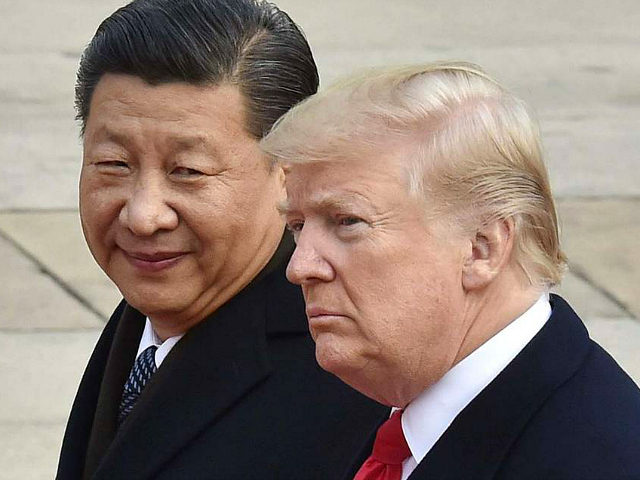U.S.-China trade negotiations have seen “no progress,” White House trade advisor Peter Navarro said on Tuesday as he laid out the series of events from Donald Trump’s 2016 campaign jobs speech to levying U.S. tariffs on $200 billion more Chinese goods.
Navarro warned during a Tuesday morning White House briefing with reporters that if the U.S. doesn’t do something to deal with China’s aggressive and unfair trade practices, then U.S. industries targeted in China’s “Made in China 2025” initiative will be compromised.
President Trump ordered the U.S. Trade Representative’s office on Monday evening to identify $200 billion more in Chinese goods to levy tariffs on. His action came in response to China’s aggressive backlash to U.S. announced tariffs on $50 billion of Chinese imports. Trump further warned that if China still fails to change their actions, he would levy tariffs on yet another $200 billion in Chinese goods, bringing the amount of Chinese goods recently levied with new tariffs to $450 billion.
“Trump is demonstrating a special kind of courage noticeably absent in his predecessors,” said Navarro.
“China seeks to acquire the crown jewels of American technology,” Navarro said, identifying six vectors in their “Made in China 2025” initiative: physical and cyber theft, forced technology transfers, evasion of export controls, export restraints on raw materials, information harvesting, and acquisition of U.S. “crown jewels.” China has been employing these methods to reach their goal of controlling 70 percent of the production in several industries by their 2025 deadline. The industries include: artificial intelligence, blockchain technology, robotics, high tech manufacturing, and high tech shipping.
The trade advisor pointed to a December 2017 national security strategy which refers to these Chinese actions as economic aggression. He said, “much of this behavior is outside the international norms.” He referenced the President, saying that America supports free and fair, but not fool’s trade.
“To be clear, President Trump has given China every change to change its aggressive behavior,” he stated emphatically.
Navarro then recounted the “clear linear path” regarding Trump and China that has led to Trump’s recent actions.
During then-candidate Trump’s presidential campaign he gave a June 2016 speech on jobs in which he “explicitly promised to take action under section 301 if China failed to stop its attacks on our manufacturing and innovation base.”
Point two on that linear path was the April 2017 summit Trump held at Mar-a-Lago with Chinese President Xi Jinping. Navarro said that all of the issues related to China’s attempts to acquire intellectual property were addressed at that summit. In the hundred days that followed China was “supposed to come up with proposed structural changes to address these. They did not,” he revealed.
In March 2018 Trump charged the U.S. Trade Representative with opening a section 301 investigation and announced potential tariffs on $50 billion in Chinese goods. The USTR initiation of the 301 investigation cited China’s cyber theft practices.
China threatened to match the U.S. tariffs with their own tariffs on $50 billion in U.S. goods. Trump shot back with a threat of another $100 billion in tariffs, after which President Xi appeared to relent and offer a potential concession in the form of reduced tariffs on U.S. auto imports to China.
Next on the path was the early May 2018 journey top U.S. trade officials took to Beijing for trade talks with Chinese counterparts. The U.S. delegation returned home with the message that “immediate attention” was needed to change the U.S.-China trade and investment relationship.
Navarro revealed Tuesday that this trip “resulted in no progress.”
In late May a Chinese trade delegation led by Chinese Vice Premier Liu He traveled to Washington, DC for continued talks with U.S. trade officials. As this round of talks concluded the two nations issued a joint statement including “a consensus on taking effective measures to substantially reduce the United States trade deficit in goods with China.”
President Trump gave insight into lack of progress on negotiations with China after the DC-based talks, telling reporters China was the “big one” among America’s bad trade deals. He added, “no, I’m not satisfied, but we’ll see what happens. We have a long way to go.”
Navarro revealed on Tuesday that the DC-based talks resulted in “again, no progress.”
Next on the path was the trip of a U.S. trade delegation back to Beijing to work out details on trade issues including reducing the trade deficit. Commerce Secretary Wilbur Ross led that trip.
“Again, no progress,” on that trip according to Navarro’s Tuesday statements. “None of these efforts by the President and his team have resulted in any progress on the two core issues facing the U.S.-China relationship.” These two issues are the reduction of the trade deficit and “China’s bid to acquire the crown jewels of American technology and intellectual property by any means necessary.”
“The actions President Trump has taken are purely defensive in nature” and designed to protect America’s “crown jewels” Navarro said. He described the new U.S. tariffs “a trade dispute, nothing more and nothing less.”
Follow Michelle Moons on Twitter @MichelleDiana

COMMENTS
Please let us know if you're having issues with commenting.